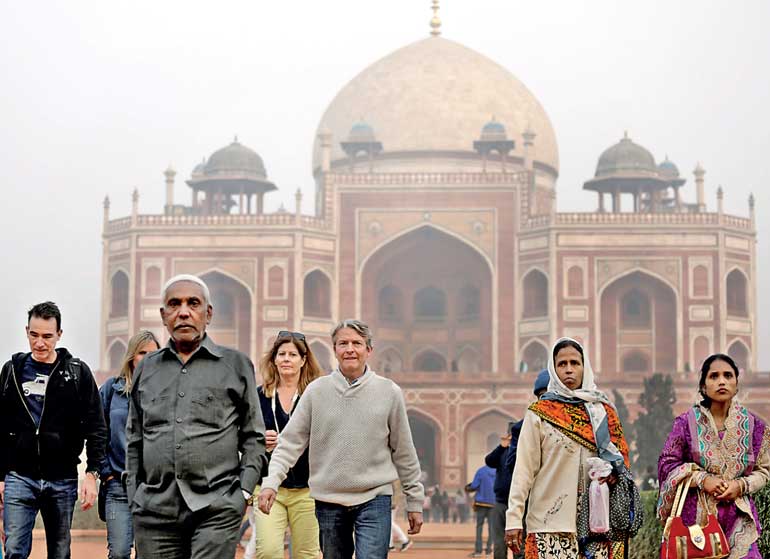Wednesday Feb 25, 2026
Wednesday Feb 25, 2026
Monday, 8 January 2018 00:22 - - {{hitsCtrl.values.hits}}
New Delhi (Reuters): India is planning to cut taxes on travel and tourism in next month’s federal budget and give more incentives to the $ 210 billion sector, government sources said, hoping to boost economic growth and create more jobs.

Domestic and foreign tourists walk in front of Humayun’s Tomb, one of the tourist destinations in New Delhi, India - Reuters
The move could add to a domestic tourism boom in the world’s second most populous nation, where low inflation and rising incomes are changing lifestyles and consumption patterns of an estimated 250 million middle-class Indians. With scores of destinations introduced on airline routes last year, air travel is also surging.
India’s tourism sector grew over 10% in the six months ending September, compared to near 8% in the year-ago period. According to an industry report, tourism employs 40 million people in India and could add 10 million jobs in a decade.
“We’ll announce measures in the budget to promote investment in the tourism sector,” a top finance ministry official told Reuters, adding that Finance Minister Arun Jaitley favours lowering a 28% tax on hotel tariffs, and offering incentives to attract private investments. If the moves come about, companies expected to benefit include airlines like IndiGo, owned by InterGlobe Aviation , and Jet Airways and hotel operators such as Indian Hotels, that owns the Taj Mahal chain and EIH Ltd that operates the Oberoi hotels in India.
Tour operators including Cox & Kings and Thomas Cook are also likely to gain.
In India tourists, on average, pay 30% tax on hotel rooms and travel compared with less than 10% in Singapore, Thailand and Indonesia, said Pronab Sarkar, president of the Indian Association of Tour Operators (IATO).
Another government official said the budget was likely to “significantly” raise allocations for tourism infrastructure and raise income tax exemptions on investments in new hotels.
A third official, who is aware of the finance ministry’s pre-budget consultations with industry groups, said Jaitley was expected to lower income tax on corporate profit, offer tax incentives on hotel construction, allocate more funds for new tourist trains and building roads to tourist destinations. The government will offer incentives to more regional airlines this year to cover new, under-served airports, the official added.
All three officials, who spoke on condition of anonymity, declined to provide numbers or share further details. India needs about 200,000 new hotel rooms, Tourism Minister K.J. Alphons told parliament this week.
“We have reached a plateau point and need more resources to create new infrastructure and develop tourist packages,” Alphons later told Reuters, adding there was huge potential in developing areas that were not the usual tourist destinations.
Prime Minister Narendra Modi has said developing tourism, particularly in India’s remote north-eastern states, is one of his top priorities.
Hotel occupancy levels in India are at their highest levels since 2008, even though many hotel chains have raised prices.
The need for rooms has been spotted by foreign investors with Japan’s SoftBank Group backing start-ups like OYO Rooms, which has emerged as the largest aggregator of budget accommodation across the country with hotels in over 200 destinations.
One major driver of the domestic tourism boom has been the launch in 2017 of five regional budget airlines on over 100 routes, which are given incentives by the government to offer cut-price flights to uncovered and remote areas, encouraging thousands of families to explore flying for the first time.
Domestic airlines carried 10.6 million passengers in the first eleven months of 2017, up 17% from the year-ago period - encouraging some established players like Spicejet , Jet Airways and Vistara, a joint venture between the Tata Group and Singapore Airlines, to start flights to new locations.
Tour operators said double-digit hikes in urban wages, coupled with an over 25% rise in the benchmark Sensex index last year, have contributed to the domestic tourism boom.
At the same time over 9 million foreigners visited India in the first 11 months of 2017, up 15.6% from a year ago.
Domestic tourists, who account for 88% of the sector, are increasingly using online portals for hotel and travel bookings.
Travel portal MakeMyTrip reported a 186% jump in hotel bookings during the September quarter and its holiday package segment that includes hotel and flight bookings, saw a 71% increase in revenues over the same period.
Online operators say tourism could emerge as the new engine of growth after the IT sector but that it needs government support.
“The government must lower the tax burden, ease rules and build infrastructure if it wants to ensure 15-20% annual growth in tourism in coming years,” said Sarkar of IATO.